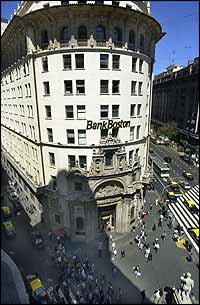Continued from page 1
The alleged ties of the First National Bank of Boston -- which later became Bank of Boston, then BankBoston -- to blacklisted enemy firms were outlined in the April 1943 OSS report entitled "Axis Connections of Certain Fire and Marine Insurance Companies Operating in Argentina." The report was prepared by Washington's wartime Board of Economic Warfare, which used global financial institutions to provide intelligence against the Axis.
|
|
 BankBoston's Buenos Aires office as it appears today. (Globe Photo / Daniel Luna)
BankBoston's Buenos Aires office as it appears today. (Globe Photo / Daniel Luna) |
"Cloaking" was a common practice in the world of global finance, said Gerald D. Feldman, a historian at the University of California and an expert on wartime insurance business. While myriad efforts are underway to make big European insurance companies pay off the policies of Holocaust victims, Feldman thinks pinning compensation claims on Allied firms would be very difficult.
"There's no compensation issue, but it's an important historical issue," he said. "It shows how interconnected these companies were during the war years."
Official denies bank link to insurance firm
After researching the issue by examining old First National Bank of Boston records, James E. Mahoney, spokesman for FleetBoston Financial, denied the implications of the OSS report.
"There's no corporate connection between the First National Bank of Boston and the Boston Insurance Co.," Mahoney said. "There is no legal connection. Boston Insurance was not a subsidiary or an affiliate of the First National Bank of Boston. We have not been able to find any records that indicate a connection to the company."
After the Globe provided bank officials with a copy of the OSS report listing a roster of executives in the insurance firm, Fleet said it had found that four Boston Insurance officials had been employed by the First National Bank of Boston's branch in Argentina. They were:
- Hilary Driscoll, an American who grew up in Malden, worked for First National's Argentina branch starting in the 1920s and was named joint manager in 1942. The OSS report said Driscoll was the insurance firm's board secretary. Driscoll was considered "one of our top guys" in Latin America, said retired First National Bank of Boston chairman Richard D. Hill. Hill joined the bank in 1946 and said he had no knowledge of Boston Insurance Co. or any bank connection to Nazi financiers. Driscoll was also the brother of Walter L. Driscoll, a vice president of the bank. Fleet spokeswoman Alison Gibbs said Hilary Driscoll retired from the bank in 1957, after spending his entire career in Argentina. He died in 1965 and his heirs, two daughters, could not be located.
- William Benkiser, a German national, who started with the First National Bank when it opened its Argentina branch in 1917 and remained there through 1935. The OSS lists him as the president of the suspect insurance company.
- Gustavo Lanus, an Argentinian who worked for First National from 1920 until Dec. 31, 1941. He was the bank's joint manager in Argentina. The OSS report says he was the insurance firm's vice president.
- Henry Wiltshire, whose nationality is unknown, worked as a submanager of the Buenos Aires branch of the First National Bank of Boston from 1936 to 1938. The OSS report lists him as an officer of the insurance enterprise.
Fleet's Gibbs said after scouring First National board minutes dating back to the 1920s, she found no indication the bank was using the insurance firm as a front for Axis dealings. Only Driscoll was actually still on the bank's payroll when the OSS listed him as an officer of the insurance firm, she noted.
Efforts to reach Benkiser, Lanus, Wiltshire, or their heirs were unsuccessful.
Another man the OSS report listed as a Boston Insurance Co. director was Benjamin Nazar Anchorena. Emilio Corbiere, manager of the main government library in Buenos Aires and author of the upcoming book "Hitler's Argentines," identified Anchorena as a Nazi collaborator, with Pallavicini. Corbiere said Anchorena was a fascist military officer.
"There was a whole tangled network of around 230 German firms and local entrepreneurs who were pro-fascist and who collaborated with the Nazis," Corbiere said. "Many of the most powerful financial families, companies, politicians, and diplomats in Argentina were collaborating with the Nazis, but a lot of the records referring to the financial network operating with Germany have disappeared."
Anchorena's grandson, Rodolfo Nazar Anchorena, said he had no knowledge of whether his grandfather was a Nazi collaborator: "In his last years he worked in the Banco Popular and in the BankBoston. It's possible -- probable -- that he had shares in both. He was one of the biggest advisers to many banks here."
